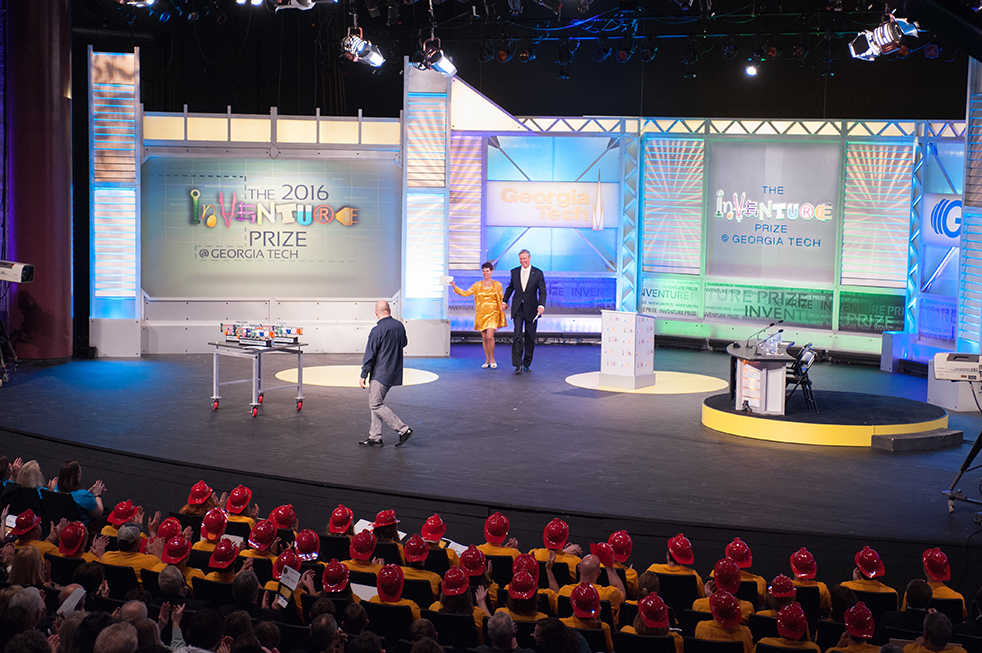Last week, the six finalist teams were announced for this year’s 10th annual InVenture Prize Competition.
Surviving two rounds of eliminations that began with a pool of 40 students, these six teams will progress to the final round on March 14, where their pitches will be scrutinized by three judges and a large audience at the
Ferst Center.
“This year, there were a lot of just top notch teams,” said Christopher Reaves, interim director for the Center for Academic Enrichment and director of undergraduate research opportunities and student innovation programs. “Great teams, great problems that they are working on, well-designed solutions.”
This year’s Inventure Prize finalists are:
Memeois. Computer science majors Anushk Mittal and Joshua Wang created an app that uses machine learning to generate a curated stream of memes.
PedalCreator. Mechanical engineering majors Dallas Condra and Jeremy Leff worked with Industrial Design major Vanya Padmanabhan to create an affordable, customizable analog effects pedal to give guitarists better control over their instrument’s sound.
pHAM. Four material science and engineering majors — Michele Lauto, Tyler Quill, Aaron Stansell and Lucas Votaw — developed a coffee filter to reduce the acidity of coffee, and plan on selling their filters to local coffee chains while broadly licensing the technology across the country.
Scal-Pal. Four biomedical engineering majors — Bailey Klee, Rachel Mann, Sydney Platt and Nicholas Quan — designed safer scalpel blade packaging to keep the blade concealed during
assembly.
Tensionr. Five mechanical engineering majors — Michael Bailey, Austin Forgey, Hannah Larson, Lauren Perrine and Brandon Will — joined forces to develop a safe tensioning tool that uses straps instead of metal to apply tension force.
Ultraview. Materials science and engineering major Kolby Hanley designed new archery grips and sights without a traditional up pin that utilize a 3D printing manufacturing process for quality, modifiable products.
Nearly all of the teams said in their online statements that they would use the InVenture Prize markets to help to build scale and expand the market for
their product.
On Thursday, Feb. 15, the finalist teams held their first pitch practice meeting with Reaves and other staff.
“We’re just starting to work with the teams real closely,” Reaves said. “It’s really just focused on the pitch for the next month.”
The groups will meet weekly to refine their pitches until the final showdown at Ferst. Besides sharpening their message, some groups will work to attract testimonials from current customers, tighten up on their businesses’ operations or file provisional patent applications to protect their inventions.
“Just looking as a group, the pitches were pretty professional already, otherwise they wouldn’t have made it this far,” Reaves said, comparing this year’s teams to previous years’ finalists. “Several of the teams already have customers that they are selling to, or using their devices, so they are certainly further along in that regard than a lot of teams in the past.”
Because 2018 marks the 10th year of Inventure Prize competition, the three judges this year, Jasmine Burton, Rachel Ford and Partha Unnava, are all previous InVenture Prize finalists (and in Unnava’s case, a previous judge), and know firsthand the experience of presenting their ideas to a crowd.
In order to watch the final round, which will occur at 7:30 p.m. Wednesday, March 14, in the Ferst Center, reserve your free tickets at inventureprize.gatech.edu. The final round can also be viewed on local television or streamed online.
